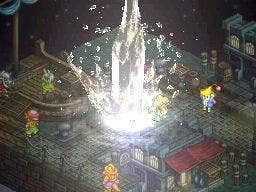Final Fantasy Tactics A2: Grimoire of the Rift
Inspect a Luso.
Battles lack urgency without the narrative drive and purpose, a problem exacerbated by a super-gentle difficulty curve. Every mission on offer to your clan is given a difficulty rating and, providing you stick to battles around your current level, you'll rarely even need to heal characters mid-fight. It was a good fifteen hours before we called upon our white mage, so even newcomers will have a grasp on the game's rules and boundaries before anything requiring much strategy comes up.
In battles, FFTA's contentious 'Judge system' makes a return. At the start of every fight an impartial judge character arrives on the scene and specifies a particular move or attack that is banned. Break this law and you lose the ability to revive defeated characters as well as any clan benefit you had equipped. The system makes sense on paper but many of the laws place restrictions on actions and reactions outside of your direct control (e.g. 'do not miss an attack' or 'do not counter'). Removing certain tools in a player's arsenal might be a way to heighten difficulty and introduce a (rigged) sense of strategy, but it doesn't make for a satisfying play mechanic, even if the consequences for going against the restriction are mild. If you successfully win a fight within the game's restraints you win extra items, the lifeblood of the game's off-battle system.
FFTA2 is a game built from resources. Items found on the battlefield must be traded in at the shop to create new weapons and armour (the only way to increase the available inventory). These weapons and armour, if used enough, bestow new abilities on the user and so the spoils of war have a direct influence on your team's offensive and defensive future capabilities. Overlaid on this system is the ability to assign team members different job classes from Warrior, to Mage to Ninja to Thief and so on. New job classes are discovered through completing missions not by pursuing development trees. It's a novel idea that adds weight to the side-quest system but the type of players who enjoy the order and mathematics of SRPGs will likely be put off by the randomness of the structure. Learning abilities and mastering jobs is painfully protracted, the journey to mastering a single job class sitting at around 20 hours. Bearing in mind you'll probably want to master a few, giving your characters a good and varied tool kit of abilities, the time investment the game requires before payoff is soon clear.

There are also some novel ideas included, such as the option to compete against other clans for ownership of map territory via auctions. Areas of the map come up for auction during specific time periods and the clan that wins the bidding becomes the area champ, a distinction that grants various benefits. Bids are made in real time using a set number of tokens representing between one and five coins with bonus awards are given for specific placings during set points in the auction (e.g. for being second in the bidding war at the midway point). This mini-game idea is exciting and well-executed but as the auction week only comes around once every 250-odd game days, it's a rare enjoyment rather than a routine one.
Despite the negatives FFTA2 is compelling. The side-quests, while mundane, are enjoyable and Square-Enix's usual, fine presentation and solid script work smoothes off the rough edges of the experience. This is, as with most SRPGs, a game for players who love to crunch the numbers, micromanaging team abilities and maximising profits. Approached with this mindset the hours will fly past thanks to the gripping if, in a post-Disgaea world, overly-simplistic battles. With a convincing story and some innovation in the fight system FFTA2 could have been so much more, but it still stands as the best example of the genre currently available for the handheld.








